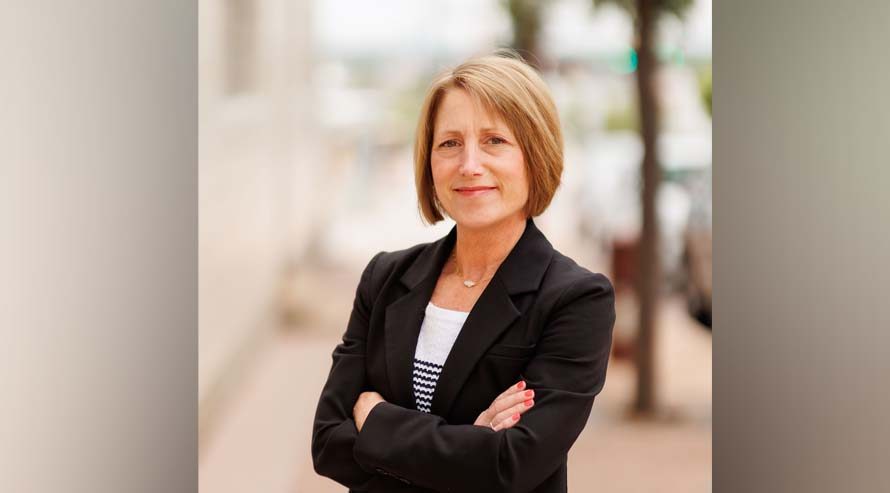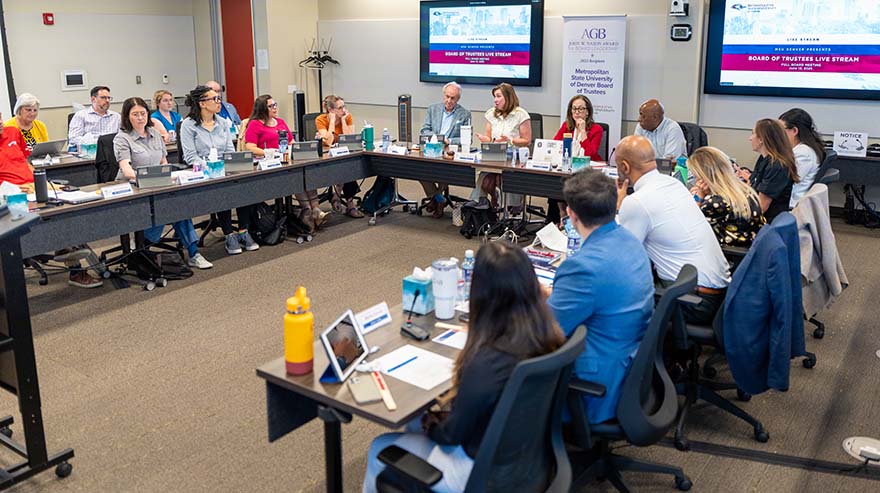Provost Alfred Tatum, Ph.D., stopped by the March 2 Metropolitan State University of Denver Faculty Senate meeting to discuss proposed changes to summer pay structure. Examination of the structure began because of wide variability in contract length and was an attempt to “right-size” faculty’s ability to pursue greater total compensation, he said.
Floor discussion included built-in variability around hour-based structure, the total number of students in classes and how workload is considered. Tatum said he wants to ensure all feedback is considered and shared with deans to conduct modeling/analysis as data continued to come in.
Senate Vice President Liz Goodnick, Ph.D. (Philosophy), led the assemblage through a couple of proposals. The second read of the Wilton Flemon Post-doctoral Teaching Fellows handbook-language addition yielded no feedback, and the subsequent vote was passed with 80 in favor, none opposed and four abstentions.
The second read and vote for the academic-subdivision reorganization proposal also passed, with 73 in favor, two opposed and nine abstentions.
Zsuzsa Balogh, Ph.D. (Civil Engineering), led a first read of the proposed Banking Policy. Work on this policy began under Pam Ansburg, Ph.D. (Psychological Sciences), and continued through the Academic Policy Committee. The policy provides a framework to assist departments in providing equitable compensation for faculty members who work in areas such as teaching internships, independent studies and research-based courses, Balogh said.
Those with questions should email her or Senate President Katia Campbell, Ph.D. (Communication Studies), prior to next session’s second read and vote.
Chief Strategy Officer Kelly Brough was a guest of the Senate, providing insight into a report to the Board of Trustees on enrollment, retention and budget processes. She walked through several trends; highlights included:
- Since the Great Recession of 2007-08, the University has seen a total enrollment decline of about 20%. Brough said retaining 1,048 students was necessary to maintain a flat level with fall 2021, and trends were directionally similar with regional competitors but proportionally different.
- Demographically, the University has seen declines in white students, with growth in Latino populations. A decline in male-identified students was consistent with national data.
- MSU Denver currently retains two of every three students year-over-year, which has been consistent over the past decade.
- Fifty-six percent of the student population is first-generation, with a steady growth trend. This sets the stage for conversations around scaling wraparound support services and looking at how MSU Denver can address housing affordability concerns. There has been a slight student residential-population shift from south and west Denver metro areas to north and east regions, but this was nominal.
- About half of the student population comprises transfers, who register at a higher rate than nontransfers. Brough noted immediate notification of acceptance, financial aid and a 24-hour turnaround window as critical to this.
- The fastest-growing undergraduate majors over the past decade were Engineering, Nursing and Aviation. The past five years saw the greatest increase in Engineering, Criminal Justice and Criminology and Psychological Sciences. Factoring in graduate programs, Social Work leads the growth increase (Brough also noted the department has retention rates of 80% to 87% annually).
Looking ahead, the University will continue to monitor industry trends, explore options such as blockchain-based credential tracking and streamlining/automating enrollment processes to enhance the user experience. The Budget Recommendation Committee is using these insights coming from across the campus to prioritize budget investments in programs to retain and attract more students, Brough said.
Other items of business included:
- Campbell reminded online hyflex attendees to message Sen. Kelly Evans if they wished to speak (instead of using Teams’ raised-hand function).
- She also provided an update that the Executive Committee is continuing to work through the workload-adjustment proposal, devoting more time and discussion with leadership into the process. The committee will also take up discussions on implementation of the University’s shift on March 7 to a mask-optional policy (with individual faculty discretion to implement on a per-course basis). Those with strong feelings either way should contact the Executive Committee, which will keep feedback confidential.
- Faculty Senate officer elections will be held in May. Campbell encouraged anyone interested in an officer role to reach out for more info. She also said she would not run to retain the president role, noting that she wants “to afford someone else the opportunity to step into the leadership role.”
- In a final act of third-person fourth-wall-breaking, University Communications and Marketing’s Cory Phare thanked the Senate for his past five years of covering the body for Early Bird recaps. “I have never seen a group of professionals more dedicated to students and the mission of a place like MSU Denver. … It has been a distinct honor and privilege to serve as your Faculty Senate reporter,” he said.








